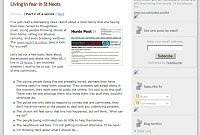 Ben runs a young people's group in Little Paxton, Pete runs youth camps every summer.
Ben runs a young people's group in Little Paxton, Pete runs youth camps every summer.We spent a lot of time talking, and a number of very interesting ideas and thoughts were shared. Pete told us about his background and how he came to be involved in youth work. Chris explained about the problems in St Neots that had started him thinking and praying, Ben explained his plans for a tent meeting in St Neots.
The amazing bombshell of the evening was provided by Pete who, in faith, had already reserved 100 places for St Neots young people for a camp at the end of July 2009. This is awesome news and had us all smiling and rejoicing. It's going to take some planning and effort, but it seems that Pete will handle the camp details and management, our role will be to find the people who will fill those 100 places.
This was an unusual meeting in every way!






